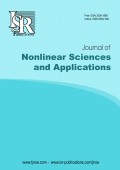Fuzzy implications based on quasi-copula and fuzzy negations
Authors
G. Souliotis
- Department of Civil Engineering, Section of Mathematics and Informatics, Democritus University of Thrace, 67100 Kimeria, Greece.
M. Th. Rassias
- Hellenic Military Academy, Greece.
- Institute for Advanced Study, Princeton, USA.
B. Papadopoulos
- Department of Civil Engineering, Section of Mathematics and Informatics, Democritus University of Thrace, 67100 Kimeria, Greece.
Abstract
In this particular paper the connection of fuzzy implications to the basic concepts of probability theory such as copula, quasi-copula and semi-copula is being studied. This study showed that fuzzy implications produced through copula, quasi-copula or semi-copula, apart from having as a common characteristic the Lipschitz condition with constant 1, this characteristic is also the cornerstone for grouping fuzzy implications according to the original generator which is no other than a copula, quasi-copula or semi-copula.
Share and Cite
ISRP Style
G. Souliotis, M. Th. Rassias, B. Papadopoulos, Fuzzy implications based on quasi-copula and fuzzy negations, Journal of Nonlinear Sciences and Applications, 16 (2023), no. 2, 99--110
AMA Style
Souliotis G., Rassias M. Th., Papadopoulos B., Fuzzy implications based on quasi-copula and fuzzy negations. J. Nonlinear Sci. Appl. (2023); 16(2):99--110
Chicago/Turabian Style
Souliotis, G., Rassias, M. Th., Papadopoulos, B.. "Fuzzy implications based on quasi-copula and fuzzy negations." Journal of Nonlinear Sciences and Applications, 16, no. 2 (2023): 99--110
Keywords
- Fuzzy implications
- fuzzy negations
- copula
- quasi-copula
- semi-copula
- aggregations functions
MSC
References
-
[1]
C. Alsina, R. B. Nelsen, B. Schweizer, On the characterization of a class of binary operations on distribution functions, Statist. Probab. Lett., 17 (1993), 85–89
-
[2]
M. Baczy´ nski, P. Grzegorzewski, R. Mesiar, P. Helbin, W. Niemyska, Fuzzy implications based on semicopulas, Fuzzy Sets and Systems, 323 (2017), 138–151
-
[3]
M. Baczy´ nski, B. Jayaram, Fuzzy implications, Springer, Berlin (2008)
-
[4]
T. Calvo, A. Koles´arov´a, M. Komorn´ıkov´a, R. Mesiar, Aggregation operators: properties, classes and construction methods, In: Aggregation operators, Stud. Fuzziness Soft Comput., 97 (2002), 3–104
-
[5]
M. Dibala, S. Saminger-Platz, R. Mesiar, E. P. Klement, Defects and transformations of quasi-copulas, Kybernetika, 52 (2016), 848–865
-
[6]
F. Durante, J. Quesada-Molina, C. Sempi, Semicopulas: characterizations and applicability, Kybernetika, 42 (2006), 287–302
-
[7]
F. Durante, C. Sempi, Semicopulæ, Kybernetika, 41 (2005), 315–328
-
[8]
J. C. Fodor, M. Roubens, Fuzzy preference modelling and multicriteria decision support, Kluwer Academic Publishers, Dordrecht (1994)
-
[9]
F. S. Garc´ıa, P. G. A´ lvarez, Two families of fuzzy integrals, Fuzzy Sets and Systems, 18 (1986), 67–81
-
[10]
C. Genest, J. J. Q. Molina, J. A. R. Lallena, C. Sempi, A characterization of quasi-copulas, J. Multivariate Anal., 69 (1999), 193–205
-
[11]
M. Grabisch, J.-L. Marichal, R. Mesiar, E. Pap, Aggregation functions, Cambridge University Press, Cambridge (2009)
-
[12]
P. Grzegorzewski, Probabilistic implications, Fuzzy Sets and Systems, 226 (2013), 53–66
-
[13]
J. Kalick´, On some construction methods for 1-Lipschitz aggregation functions, Fuzzy sets and Systems, 160 (2009), 726–732
-
[14]
L. Kitainik, Fuzzy decision procedures with binary relations, Kluwer Academic Publishers, Boston (1993)
-
[15]
E. P. Klement, R. Mesiar, E. Pap, Triangular norms: Basic notions and properties, In: Logical, Algebraic, Analytic and Probabilistic Aspects of Triangular Norms, Elsevier B. V., Amsterdam, (2005), 17–60
-
[16]
A. Koles´arov´a, 1-Lipschitz aggregation operators and quasi-copulas, Kybernetika, 39 (2003), 615–629
-
[17]
R. Mesiar, A. Koles´arov´a, Quasi-copulas, copulas and fuzzy implicators, Int. J. Comput. Intell. Syst., 13 (2020), 681–689
-
[18]
R. B. Nelsen, An introduction to copulas, Springer, New York (2006)
-
[19]
M. ˇSabo, P. Streˇzo, On reverses of some binary operators, Kybernetika, 41 (2005), 435–450
-
[20]
G. Souliotis, B. Papadopoulos, An algorithm for producing fuzzy negations via conical sections, Algorithms, 12 (2019), 8 pages

